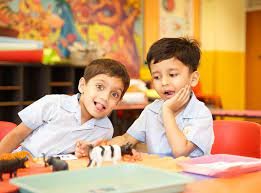Children today are expected to do a lot more than their age requires them to do. Whether it be in school or in sports, kids need to prove themselves at a very early age. Despite caring for our kids and sheltering them from all sorts of harm, we unknowingly subject them to unnecessary struggles by making everything about competition. If we look at certain institutions such as any preschool in Singapore, Japan or Canada, we can clearly see the constructive measures taken to ease this pointless weight by restricting a child to compete in only selected after-school activities.
In this day and age, parents are more focused on making their kids excel in everything they do rather than developing their unique skills and talent. Extracurricular activities used to be a way out of the restrained traditional educational structure, where children could enhance their personalities outside of just academics. However, with time, after-school activities have started taking over a child’s entire day, stuffing it with numerous hobbies and forced expectations to succeed. In this blog, we will be discussing whether the burden of extracurricular activities is a little too demanding on our kids or not.
Straining Relationships
Researchers have concluded that employing kids in more than one extracurricular activity after school can strain their relationships at home. This scenario arises because kids do not spend enough time doing mundane activities at home, which are pivotal in character building. Too much time away from home, and engagement in draining activities after tedious school days, have a lasting impact on kids. They end up becoming extremely competitive and disregard the value of traditional ways of interaction and education.
Children need ample time at home to be nurtured after spending almost an entire day at school, away from family. This might sound like an old-fashioned notion, but family time is essential in making a child more sensitive towards one another in the long run. Mutual relationships at home must be made a priority, along with extracurricular activities. This can only be done if the child is made to engage in only a couple of activities in one day. Overbearing hobbies are never good for the overall development and often hinder in improving morale for little kids.
Everything in Moderation
It can be seen today that parents have become even more competitive than their kids. This constant desire of one-upping their kids in front of others has created a rift between parents and children. To establish their dominance in society, parents pressure their kids to participate and excel at endeavours, adversely affecting their kids’ psyche. This is because the already-demanding education system is a lot for kids to handle in itself. If they are forced to compete after school, their physical and mental health suffers.
The solution for this can only be moderation in extracurriculars after school. Young children have vulnerable minds which require gentle care from teachers and parents. There should not be too much to do for them after they reach home at the end of a hectic day at school. In most cases today, schools have also stressed upon the need for idle relaxation time for kids. In the far east, where school days last from 6 am in the morning to 9 pm at night, kids and young adults do even have enough time to have proper meals.
The best schools in Singapore and Japan have made sure to advise parents against occupying their kids in more than one extracurricular activity. Public schools and private educational institutions have realized that if they want to raise successful adults for the future, they must be wary of their time and energy not being exhausted due to excessive load. The concept of holistic development of children in a natural environment is hopefully the only way to neutralize the struggles of kids trying to be the best at everything.

